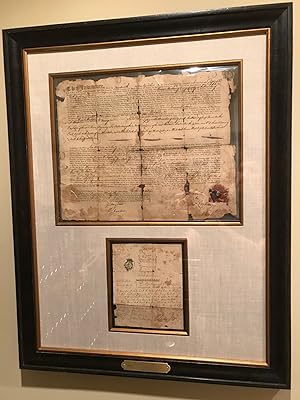About this Item
Indenture from Lord Granville to Herman Husband of Orange County in the Province of North Carolina, Planter, of six hundred and forty acres of land lying and being in the Parish of St. Matthew in the County of Orange, dated 13 November 1755, signed by Francis Corbin and Benjamin Wheatley, land agents for Lord Granville, partial red seal remaining [fragile condition], together with Land Plat surveyed by William Churton of the above Indenture. Custom framed behind archival glass. An amazing piece of American history, this is an original Lord Granville Land Grant to Herman Husband (December 3, 1724 - June 19, 1795). Herman Husband was an American farmer, pamphleteer, author, and preacher. He is best known as a leader of Regulator Movement, a populist rebellion in the Province of North Carolina in the years leading up to the American Revolutionary War. In the 1760s, he was involved in the resistance to the corrupt practices of predatory government officials- mainly the lawyers and judges. He was elected to the colony's assembly and spoke out against governmental abuses. His story is reminiscent of that of John Wilkes. He was jailed for speaking out and then set loose when an angry mob of armed backwoods farmers was coming to free him. The resisters organized and began calling themselves "Regulators" because they wanted to regulate the government, that is- to force it to obey the laws. Thus the movement is known as the Regulator Rebellion. Mob action was taken to prevent the worst abuses of the courts. Husband always denied he was a Regulator, and indeed, as a pacifist, he wouldn't take part in violence or threats of violence. But he was a spokesman and a symbol for the resistance. He had several tracts printed the best-known being "Shew Yourselves to be Freemen" (1769),"An Impartial Relation of the First and Causes of the Recent Differences in Public Affairs" (1770), and "A Fan For Fanning And A Touchstone For Tryon" (1771). In 1770, Husband was expelled from the state legislature, ostensibly for libel but most likely due to his affiliation with the Regulators. When the officers of Rowan County, North Carolina agreed to decide the dispute between themselves and the Regulators through a committee of arbitration, Husband was selected to serve on the committee. Husband accompanied the Regulators on the morning of the Battle of Alamance (May 16, 1771) and sought to bring about an adjustment. Seeing this was impossible, he mounted his horse and rode away, his Quaker principles dictating that he avoid participation in a fight. After the "rebellion" was crushed at the Battle of Alamance, Husband fled to Maryland under the name "Tuscape Death" and later called himself "Old Quaker". He only openly reclaimed his own name after the American Revolution. Seller Inventory # 100728
Contact seller
Report this item
![]()




